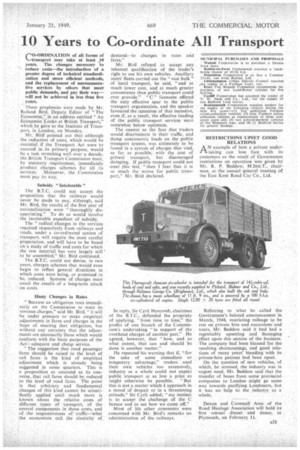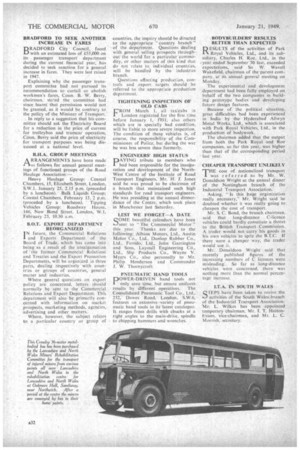10 Years to Co-ordinate All Transport r O-ORDINATION of all
Page 7

Page 8

If you've noticed an error in this article please click here to report it so we can fix it.
forms of -..transport may take at least ,19 years. The changes necessary to reduce costs—the introduction of a greater degree of technical standardization and more efficient methods, and the replacement of unremunerative services by others that meet public demands, and pay their way— will not be achieved in less than five years.
These prophesies were made by Mr. Roland Bird, Deputy Editor of "The Economist,". in an address entitled "An Economist Looks at British Transport," which he give to the Institute of Transport. in London, on Monday.
Mr. Bird pointed out that although the reduction of costs, which would be essential, if the Transport Act were to succeed in its primary purpose, would be a task stretching well over a decade, the British Transport Commission trust, by statutory requirement, immediately .produce charges schemes for all its services. Moreover. the Commission must. pay its way. .
Subsidy "Intolerable" The B.T.C. could not accept the proposition that the railways would never be made to pay, although, said Mr. Bird, the results of the first year of nationalization were "thoroughly disappointing." To do so would involve the intolerable expedient of subsidy. The "radical changes in the services required respectively from railways and roads, under a co-ordinated system of transport, will require the most careful preparation, and will have to be based on a study of traffic and costs for which the raw material has very largely still ' to be assembled," Mr. Bird continued.
• The B.T.C. could not devise, in two years, charges schemes that would even
• begin to reflect general directions in which costs were being, or promised to be. reduced. Systems of charges must await the results of a long-term attack on costs.
Hasty Changes in Rates "Because an obligation rests immediately on the Commission to meet its revenue charges," said Mr. Bird, "it will be under pressure to make empirical adjustments in fares and charges in the hope of meeting that obligation, but without any certainty that the adjustments are necessarily those which would conform with the basic purposes of the Acts—adequate and cheap service.
"The suggestion that road passenger fares should be raised to the level of rail fares is the kind of empirical adjustment which is already being suggested in some quarters. This is a proposition as unsound as its converse, that rail fares should be. reduced to the level of road fares. The point is that arbitrary and fundamental changes of this kind cannot be scientifically applied until much more is known about the relative costs of different types of transport, of the several components in those costs, and of the responsiveness of traffic—what the economists call the elasticity of demand—to changes in rates and fares."
Mr. Bird refused to accept any inherent qualification of the trader's right to use his own vehicles. Ancillary users' fleets carried out the "vast bulk" of local transport, he said, "and at much lower cost, and at much greater convenience than public transport could ever provide." "C" licensees offered the only effective spur to the public transport organization, and the speaker favoured the retention of that incentive, even if, as a result, the effective loading of the public transport services were somewhat below optimum.
The answer to the fear that traders would discriminate in their traffic, and dump uneconomic loads on the public transport system, was ultimately to be found in a system of charges that vied, so far as possible, with the cost of private transport, but discouraged dumping. If public transport could not meet this test, " then I fear, that it is so much the worse for public transport," Mr. Bird declared.
In reply, Sir Cyril Hurcomb, chairman ot the B.T.C., defended the propriety of applying, "from time to time," the profits of one branch of the Commission's undertaking "in support of the overhead charges of another part." He agreed, however, that "how, and to what extent, that can and should be done is another matter."
He repeated his warning that if, `&for the sake of some immediate or temporary advantage," traders used their own vehicles too extensively, industry as a whole could not expect public transport at as low a price as might otherwise be possible. "But this is not a matter which I approach in a mood of despair or in a threatening attitude," Sir Cyril added; "my instinct is to accept the challenge of the C licence and to see how we come off."
Most of his other comments were concerned with Mr. Bird's remarks on administration of the RESTRICTIONS UPSET GOOD RELATIONS
AN example of how a private under
taking can lose face with its customers as the result of Government restrictions on operation was given by Mr. R. P. Beddow, M.Inst.T., chairman, at the annual general meeting of the East Kent Road Car Co., Ltd.
Referring to what he called the Government's belated announcement in March, 1948, restricting mileage to be run on private hire and excursions and tours, Mr. Beddow said it had had a regrettably upsetting and damaging effect upon this section of the business. The company had been blamed for the resulting shortcomings, and good relations of many years' ttanding with its private-hire patrons had been upset.
On the question of new vehicles, of which, he stressed, the industry was in urgent need, Mr. Beddow said that the transfer of buses from some provincial companies to' London might go some way towards pacifying Londoners, but it was no help to the industry as a whole.
Devon and Cornwall Area of the Road Haulage Association will hold its first annual dinner and dance, at Plymouth, on February 11. BRADFORD TO SEEK ANOTHER INCREASE IN FARES
BRADFORD City Council, faced with an estimated loss of £55,000 on its passenger transport department during the current financial yer, has decided to seek sanction for a general increase in fares. They were last raised in 1947.
Explaining why the passenger transport committee had not pursued its • recommendation to curtail or abolish workmen's fares, Coon. B. W. Berry, • chairman, sta!ed the committee had • since learnt that permission would not be granted, as it would be contrary to the policy of the Minister of Transport. In reply to a suggestion that his Omrnittee should ask the Electricity Board . for a reduction in the price of current for trolleybus and tramcar operation, Conn. Berry said the price of electricity for transport purposes was being discussed at a national level.
R.H.A. GROUP MEETINGS
A RRANGEMENTS have been made il.aa follows for annual general meetings of functional groups of the Road Haulage Association:- Heavy Haulage Group: Coastal Chambers, 15, Elizabeth Street, London, S.W.], January 25, 2.15 p.m. (preceded by a luncheon). Bulk Liquids Group: Coastal Chambers, February 15, 2 p.m. (preceded by a luncheon). Tipping Vehicles Group: Roadway House, 146, New Bond Street, London, W.1, February 23, 10.30 a.m.
B.O.T. EXPORT DEPARTMENT REORGANIZED
TN future, the Commercial Relations 1 and Exports Department of the Board of Trade, which has come into being as a result of the amalgamation of the former Commercial Relations and Treaties and the Export Promotion Departments, wilt be organized in three parts, dealing respectively with countries or groups of countries, general matter and industries.
Where general questions on export policy are concerned, letters should normally be sent to the Commercial Relations and Export Department. ThiS .department will also be primarily concerned with information on market prosPects, marketing methods, agencies, advertising and other matters.
Where, however, the subject relates to a Particular country or group of countries, the inquiry should be directed to the appropriate 'country branch" of the department. Questions dealing with general selling prospects throughout the world for a particular commodity, or other matters of this kind that do not relate to individual countries, will be handled by the industries branch.
Questions affecting production, controls and export targets should be referred to the appropriate production department.
TIGHTENING INSPECTION Of OLD CABS ,CROM March 1, all taxicabs in London registered for the first time before January 1, f931, also others which are in specially bad condition, will be liable to more severe inspection. The condition of these vehicles is, of course, the responsibility of the Commissioner, of Police, but durl`ng the war he was less severe than formerly.
ENGINEERS' HIGH STATUS DAYING tribute to members who had been responsible for the inauguration and development of the -NorthWest Centre of the Institute of Road Transport Engineers, Mr. HI .1.1 Jones said he was proud to be chairman of a branch that maintained such high standards for road transport engineers. He was presiding at the annual dinner'dance of the Centre, which took place in Manchester last Saturday.
LEST WE FORGET—A DATE QOME beautiful calendars have been Isisent to "The Commercial Motor " this year. Thanks are due to the following: Albion Motors. Ltd., Austin Motor C.o., Ltd., Dunlop Rubber Co,, Ltd., Ferodo, Ltd., John Garrington and Sons, Laystall Engineering CO„ Ltd,, Slip Products Co., Wayne V. Myers Co., also personalty to Mr. Philip Henderson and Commander J. W. Thornycroft
PNEUMATIC HAND TOOLS DOWER-DRIVEN hand tools not I only save time, hut ensure uniform results by different operatives. The Consolidated Pneumatic Tool Co., Ltd., 232, Dawes Road, London,. S.W.6, features an extensive-variety of pneumatic hand tools in its latest catalogue. It ranges from drills with chucks at a right angles to the main-drive, spindle to chipping hammers and wrenches. . BODYBUILDERS' RESULTS BETTER THAN EXPECTED
RESULT5 of the activities of Park Royal Vehicles, Ltd., and its subsidiary, Charles H. Roe. Ltd., in the year ended September 30 last, exceeded expectations, said Sir W. Wavell Wakefield, chairman of the parent company, at its annual general meeting on Monday.
The experimental and development department had been fully employed on behalf of the two companies in building prototype bodies and developing future design features.
Because of the political situation. great difficulties had been experienced in India by the Hyderabad Allwyn Metal Works, Ltd., which is associated with Park Royal Vehicles, Ltd., in the production of bodywork. The chairman added that the output from both the Park Royal and Roe companies, so far this year, was higher than that of the corresponding period last year.
CHEAPER TRANSPORT UNLIKELY
THE cost of nationalized transport was ref erred tin by Mr. W. Donaldson Wright at the annual dinner of the Nottingham branch of the Industrial Transport Association.
Asking, "Is this huge organization really necessary," Mr. Wright said he doubted whether it was really going to cheapen the cost of transport.
Mr. S. C. Bond, the branch chairman, said • that long-distance C-licence vehicles could hardly constitute a threat to the British Transport Commission. A trader would not carry his goods in his own vehicles to spite the B.T.C. If there were a cheaper way, the trader would use it.
Mr. Donaldson Wright said that recently published figures of the increasing numbers of C licences were misleading: So far as long-distance vehicles were concerned, there was nothing more than the normal percentage increase.
I.T.A. IN SOUTH WALES
STEPS have been taken to revive the activities of the South Wales branch of the Industrial Transport Association. 'Mr. L. Wilkes has been appointed temporary chairman, Mr, I. T. HattonEvans, vice-chairman, and Mr. L. C. Morrish, secretary.




























